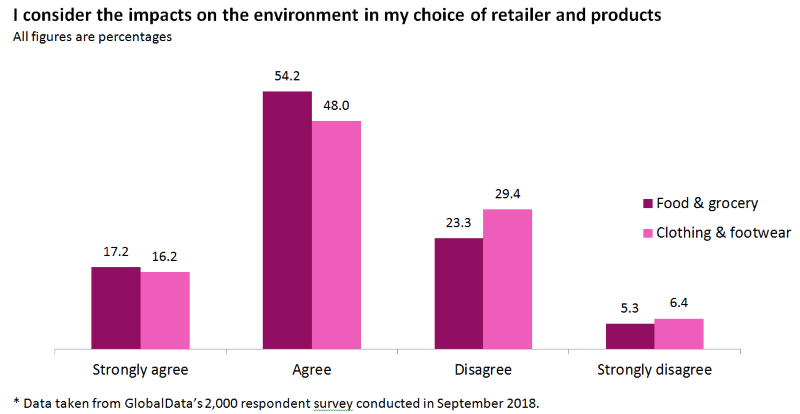
The supermarkets’ newfound environmental efforts regarding plastic waste are definitely chiming with the public, according to new research from GlobalData.
In a survey conducted in September, 71.4% of consumers said they consider the environmental impacts of their choice of food & grocery retailers and products. This falls to 64.2% for clothing & footwear but demonstrates that non-food retailers must also make changes to minimise their impact on the environment while clearly communicating their commitment to shoppers.

Since the BBC’s Blue Planet documentary series showed the devastating effects that the sheer volume of plastic waste has on marine life bringing the issue to the forefront of consumers’ minds, grocers have had to react and make changes.
Many major retailers have announced plastic reduction plans in an attempt to show consumers their concern for the environment – for instance, Morrisons will introduce paper bags for loose fruit and vegetables, and Lidl will stop using unrecyclable black plastic packaging. Although the retail industry’s impact on the environment goes far beyond the use of plastic, the recent heightened awareness is likely to have contributed to the high level of consumers considering environmental impacts, as shown in the data.
How well do you really know your competitors?
Access the most comprehensive Company Profiles on the market, powered by GlobalData. Save hours of research. Gain competitive edge.

Thank you!
Your download email will arrive shortly
Not ready to buy yet? Download a free sample
We are confident about the unique quality of our Company Profiles. However, we want you to make the most beneficial decision for your business, so we offer a free sample that you can download by submitting the below form
By GlobalDataThat fewer consumers consider the environment when buying clothing and footwear may be down to a lack of awareness and scarcity of more sustainable, yet affordable, options apart from a small number of in-house lines such as H&M’s Conscious Collection.
Consumers are more distanced from the sourcing, processing and packaging of non-food products, as most items are presented packaging-free, with the exception of online orders. Though some retailers, such as H&M and Marks & Spencer, have well-established clothing recycling schemes, there is little information about the environmental impacts of the sector, and these schemes are insufficient to make sustainable choices more widely available.
Fewer clothing & footwear retailers are making firm commitments to sustainability in comparison to grocers, despite the majority of consumers stating that they consider the environment when purchasing clothing & footwear. As the environment becomes a bigger priority in a competitive market, retailers’ stances on sustainability must be clearer to the customer.








